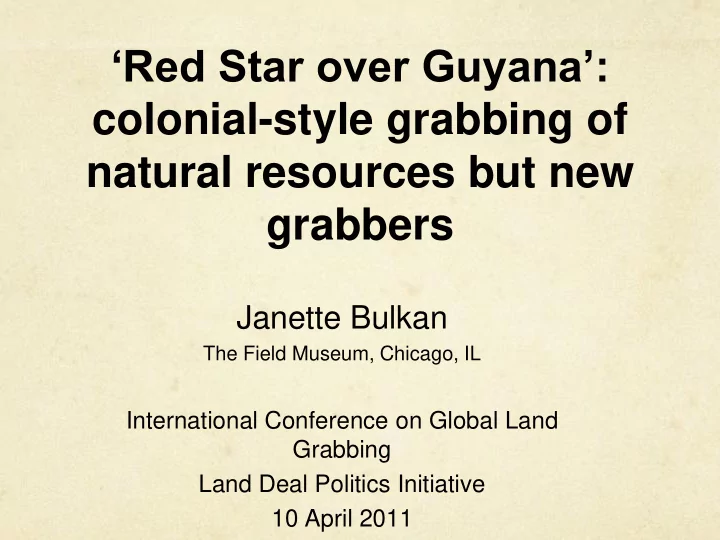

‘Red Star over Guyana’: colonial-style grabbing of natural resources but new grabbers Janette Bulkan The Field Museum, Chicago, IL International Conference on Global Land Grabbing Land Deal Politics Initiative 10 April 2011
2
‘the great sucking sound of China’ - Kaimowitz (2004) • Bauxite, gold, timber • All extracted in State Forests allocated under concessions • Within 20 years, Chinese companies had established control over the resource (bauxite, timber) or over a major part of the trade (gold) • Set up enclave economies, de-linking these products from existing local or foreign markets 3
Strategic approach, highly capitalized • Natural resources never treated as strategic by Guyana government; • Government as a price taker • In contrast, Chinese companies are strategic – direct concessions – renting – management contracts – through control of trade in final product 4
Commodity exports in 2009 Commodity 2009 export value (millions of USD) Gold 285 Bauxite 80 Timber 42 Total value 407 Total value of 6 export 768 commodities in 2009 Gold, bauxite, timber as % 53 % of total exports 5
Chinese takeaway in other sectors • • Import-export trade Geologists, medical and other technical • People smuggling, experts embedded linked to restaurants in government • Construction agencies projects (factories, electricity transmission system, fibre optic telecom network) • Hydro electric power dam - USD 450 6 million
The governance context in Guyana • Highly centralized and secretive allocation process • Foreign investment contracts are handled by the Office of the President • Regulations are commercially negotiable, whatever the law may require. • FDI contracts are written by the external investors themselves 7
Bauxite – high grade, high volume, no managerial capacity • Ore bodies - 700 M tonnes - include some of the highest grades in the world. • Thick overburden and poor shipping facilities raise costs. • Economy of scale requires large capital investment and skilled management. • 85% of university students emigrate in first 5 years after graduation. 8
BOSAI Minerals Group • Listed in the top 500 privately owned enterprises in China • 2007: acquired 70 % of shares in Guyana’s major bauxite company for USD 46 M • Tax concessions worth ~ USD 3 M annually • Bosai now controls ~ 95 % of world production of refractory grade bauxite • Chinese investment promises of USD I billion conditional on world price • Local employment - < 500 workers 9
Gold – can be mined at all levels of skill and capital • Mainly the rentiers of mining licences make fortunes. • High world price for gold and almost no effective environmental controls encourage many entrants in spite of low recovery rates. • Smuggling 30-80% of output to avoid 7 % taxes. • Chinese buyers in Suriname pay higher prices in cash for Guyanese gold - ~ USD 50- 70 M 10
Timber – 15 years of increasing demand for logs in China and India Systemic regulatory capture pioneered by Malaysian Chinese logger in 1991. FDI arrangements favour Asian loggers over local loggers. Under-capitalised Guyanese rent illegally to Asians. Political selectivity in application 11 of legislation and code of practice.
Zheng He in modern dress • Super-profits on log exports equal declared FOB price. • Circumstantial evidence for semi-planned resource grabbing. • Dark, hard and heavy timber species favoured • Chronic scarcity of wood for domestic processing • Few local jobs created - IPO of Samling: 400 Guyanese employed 12
‘Great ecological exchange’ • Last remaining frontier forests fast degraded by scale and intensity of logging and mining 13
Geopolitical context • Guyana is not strategically important in global politics. • Provides opportunities for easy pickings for Chinese companies • Strong support from Chinese Embassy 14
China’s expanding role in the IDB, World Bank • 2008: China issued new Policy Paper on Latin America and the Caribbean • October 2008: 48 th member country in the Inter-American Development Bank; committed USD 350 million - of which - • USD 125 million committed to the IDB’s Fund for Special Operations, which provides soft loans to Bolivia, Guyana, Haiti, Honduras and Nicaragua 15
Leverage in multilateral and regional institutions • Additional USD 30 million committed to the Caribbean Development Bank for expanded bilateral grant aid and loans to governments on preferential terms • Seats on IDB’s Board of Executive Directors and Board of Governors 16
China - playbook repeated globally • But poor communication between countries hosting Chinese loggers and miners prevents counters to regulatory capture 17
‘Workshop of the world’ • Discrete international processes need better coordination • Insist on independent multi stakeholder processes • Less lip service to Govt. and insist on independent forest monitoring 18
And from Guyana’s perspective? • National Development Strategy 1995-6 never implemented, no action plan. • Integrated national land use planning never implemented. • Award of NR licences – sometimes auctioned, sometimes under the table. • Trading of carbon from avoided deforestation simultaneous with logging and mining? – President’s intention. • Corrupt regime flooded with laundered drug money and guns. 19
Concluding thoughts • Multilateral institutions - ineffective in face of high- level corruption • Although small for China, volumes of NR harvested without formal controls in host developing countries forestall future possibilities for sustainable development • Need for joined-up policy at local and international levels, and support for civil 20 society watchdogs
Recommend
More recommend